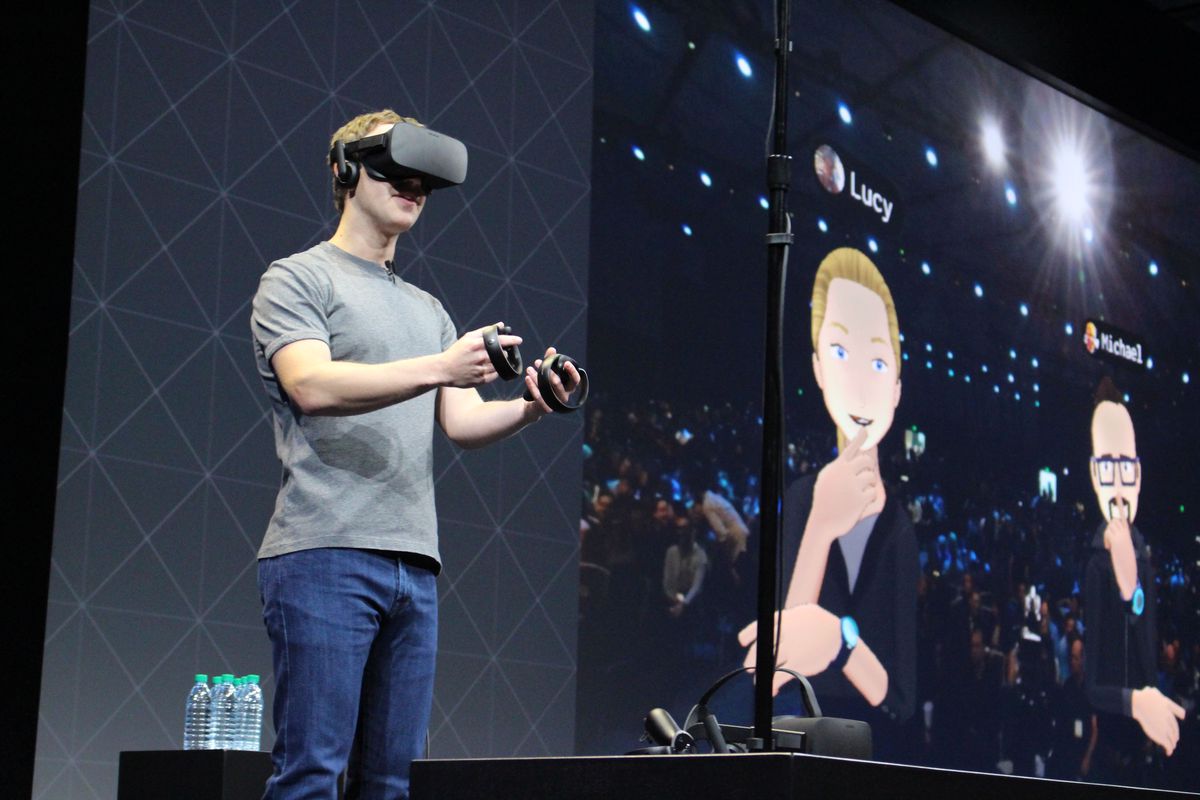It’s the next big breakthrough in technology. It’s a joke. It’s a marketing strategy. It’s a techno-dystopian nightmare. It’s the metaverse — defined most simply as a virtual world where people can socialize, work, and play — and Facebook’s CEO Mark Zuckerberg believes it is the future of the internet and of his trillion-dollar company.
Although “metaverse” became a buzzword after Facebook changed its company name to “Meta” last month, many people are still trying to understand what exactly the metaverse is and whether the futuristic technological concept is something they should take seriously.
Many critics and skeptics have mocked Zuckerberg’s plan to change Facebook from a social media company to a metaverse company. Some critics say that by focusing on the metaverse and renaming itself while the company is reeling from a PR crisis, Facebook is distracting from the problems it creates or contributes to in the real world: issues like harming teens’ mental health, facilitating the spread of disinformation, and fueling political polarization.
Even some of Facebook’s own employees, according to internal company communications viewed by Recode, are concerned about the metaverse — as reflected by questions several employees asked ahead of a weekly staff Q&A on Facebook’s internal communications platform, Workplace. One question, which was highly upvoted by employees, was, “How could we avoid a dystopian reality, where the metaverse is used as an ‘opium for the masses?’” Another highly ranked question asked, “How will we meaningfully put safety, integrity, and responsibility first in the Metaverse? We barely are able to cover the real world today.”
Other observers have noted that Facebook’s metaverse idea isn’t new — plenty of other companies, like Roblox, Nvidia, and Microsoft, have also been building out virtual worlds with virtual or augmented reality tech. And others point to how undeveloped the technology is — in the version of the metaverse that Facebook has built so far, the digital avatars it offers as stand-ins for our physical bodies are cartoonish, awkward, and often legless.
Even if these criticisms and questions stand, Facebook’s investment in the metaverse is something we should take seriously. Mark Zuckerberg sees the metaverse as the “successor to the mobile internet,” an invention that reshaped all our lives by allowing us to go online anywhere, and made it possible for Facebook’s current business to exist. If the metaverse becomes everything Zuckerberg wants it to be, it could similarly shake up the world, shifting our existence from being rooted in the physical world to one in which our digital presence increasingly supplements our real one.
In response to concerns about the metaverse, Facebook, which recently renamed itself Meta, pointed to a statement from a September blog post by Facebook executives Andrew Bosworth and Nick Clegg that reads, in part, “Meta is not going to build, own, or run the metaverse on its own. We are starting conversations about our vision for the metaverse early, before some of the technologies even exist. … We’re discussing it now to help ensure that any terms of use, privacy controls or safety features are appropriate to the new technologies and effective in keeping people safe.”
Facebook also said it’s doesn’t want to be the only one developing the metaverse. “This won’t be the job of any one company alone. It will require collaboration across industry and with experts, governments and regulators to get it right,” reads another line from the blog post.
The company is betting a lot on this concept succeeding. It’s putting some of the brightest engineering minds in the world to work on this project, acquiring virtual reality and augmented reality companies, hiring over 10,000 people to work on it, and backing the initiative with tens of billions of dollars. And Zuckerberg, who ultimately has unilateral control over his company, seems genuinely excited about it.

While the timeline is still unclear, it’s likely we’re headed toward a future where we could all be using some yet-to-be-determined version of the metaverse to go online. And Facebook is determined to play a major role in building and shaping this new realm, meaning that even if Facebook doesn’t single-handedly own the metaverse (as it has insisted it won’t), it’s still striving to wield control over it. That means Facebook may one day have even more influence over our daily lives.
Today, Facebook still has to operate under the parameters set by Apple and Google, which make and control the world’s dominant smartphone operating systems. But in this new world that will likely rely on VR/AR headsets and digital sensors, Facebook is striving to create its own rules and operating platform.
So even if you’re not itching to jump into the metaverse anytime soon, you should pay attention to it, and to how Facebook is investing in it.
So what is the metaverse, really?
Table of Contents
On a philosophical level, the metaverse, as Zuckerberg and others have defined it, is a way for us to make our virtual lives more seamlessly integrated with our real ones.
It will be “like we’re right there with people no matter how far apart we actually are, we’ll be able to express ourselves in new joyful, completely immersive ways,” said Zuckerberg in an October speech during which he demoed his vision of the metaverse.
The idea is to create a more immersive internet, in which we’ll use tech like AR and VR to spend our time engaging in virtual spaces and experiences rather than the physical world. The term was first coined in Neal Stephenson’s 1992 science fiction novel Snow Crash, but now, Zuckerberg and many other tech executives want to make it a reality.
Matthew Ball, a technology investor who wrote a definitive series of essays about the metaverse, explained it to me in part like this:
“Right now the internet is primarily something that is ‘push.’ You are pushed information, you receive an email, you receive a notification, you then pull up your device to access that.” The difference with the metaverse is that it’s an “embodied engine” you are “already within, rather than reaching out,” Ball said.
Practically, that means this world will disengage us from our physical realities: the office, the living room, the outdoors. We will instead plug into our headsets or otherwise be immersed in another environment.
Depending on how you see it, that could mean an improvement to your life; your surroundings or your physical appearance can be updated virtually. Or it can be read as a dystopian concept, as though the metaverse is for people who are escaping the grim circumstances of the real world (which is how it was envisioned in the novel Snow Crash).
For now, though, any conversation about the metaverse is largely hypothetical. Facebook will be the first to tell you that it’s still in its infancy. Zuckerberg has said that it “does not fully exist” yet, and that we have just the “building blocks” — like Facebook’s Oculus Quest 2 headset, which costs $299 and has significantly lowered the entry price point for VR devices. For comparison, an HP Reverb G2 Virtual Reality Headset currently costs $450, and the HTC Vive Cosmos goes for upward of $600.
But to take this hypothetical conversation to another level, I stepped into Facebook’s metaverse using a loaned Oculus headset. The first time I tried it out, I was impressed. The graphics have come a long way since I last used a VR headset (just a few years ago), and that made my experience transporting. But in a reflection of how young the technology still is, I found it impractical to use for long stretches of time, especially outside of an entertainment or gaming capacity.

Before I got started in the metaverse, I shifted furniture around in my apartment so I could explore without bonking into corners. After I put on the Oculus VR goggles, I moved on to the most important step: setting up my digital avatar.
Facebook gave me options to customize my avatar with features like skin tone, clothes, makeup, eyebrows, and even facial wrinkles. After spending 20 minutes tweaking my avatar to look more like me, I settled on a cartoon version of me that looked close enough. Then I headed to my default Oculus 3D home screen, a virtual room that looks like a tropical hotel lobby with palm trees, hanging egg-shaped chairs, and views of red rock mountains in the distance — a definite upgrade from the decor of my 500-square-foot studio apartment.

In its current form, my options for stuff to do in the metaverse were limited to activities like playing games, watching VR videos, and attending meetings. I played some games and watched YouTube videos in 3D; the highlight was dancing with a robot with gummy arms that beckoned me to twist and twirl with it.
Then I took a mock work meeting using Meta’s VR meeting software, Horizon Workrooms, which gave me a glimpse of how Facebook is envisioning the future of work in virtual worlds.
As I sat in a virtual meeting room with my cartoon avatar, I was able to do some things I couldn’t on a video call: I could turn my head toward my meeting mate and hear her voice more loudly than when I turned away; I could pinch my fingers to draw a note on a virtual chalkboard wall (although this was a bit challenging to get right), and I could see meeting participants all hang out in the same “room” together, rather than their heads cropped into a mosaic of side-by-side 2D boxes like they would be on a Zoom call. But there were clear drawbacks — mainly, that my avatar didn’t have any legs (because the headset can’t pick up your leg motions the way it can your head and hands, there are no legs in the Horizon Workrooms app), and I looked less professional than a normal video or picture of myself.

After I spent a few hours in the metaverse, more drawbacks of this new world emerged. For one, I started to sweat and feel nauseated. My headset weighed on my face. Anytime I wanted to play a game in this space that Facebook hadn’t developed itself, I had to go through the process of creating a new avatar from scratch. The initial wonder I had felt started to drain away. It’s hard to imagine myself wanting to hang out in the current version of Facebook’s metaverse for long stretches of time.
That being said, technology develops quickly, and it’s easy to imagine a world where all the practical problems I had with the metaverse are solved with lighter headsets, advanced hardware, and improved avatar graphics. But there are major technical challenges for Facebook to sort out here, and they’re going to take investment.
Why Facebook is going after the metaverse
Those are investments Facebook is willing to make because it sees the metaverse as the successor to the mobile internet. The technology creates an opportunity for Zuckerberg and Facebook to get ahead of the competition.
Unlike Apple or Google, which created iOS and Android, Facebook doesn’t control an operating system. Facebook has famously feuded with Apple over the fees the company charges for purchases made on iPhone apps, and the general control it exerts over companies like Facebook via its terms for developers.
For Facebook, this is a chance to become less reliant on Apple and Google.
“Not only is there an extraordinary opportunity for Facebook to build value in the metaverse, but it also provides them another opportunity to establish something that they lack and that has been a hindrance for years,” Ball told me. “For any of these major tech companies that have the assets, resources, capabilities, and interest in the metaverse, it absolutely makes sense for them to be investing in it.”
However, some close to the company see Facebook’s investments in virtual reality as a diversion from fixing the company’s tedious real-world problems.

It’s a “lot more fun to build a metaverse” than it is to answer the tough questions Facebook is facing about issues like political polarization, the spread of misinformation, or teenagers’ mental health, Brian Boland, a former vice president of partnerships and marketing at Facebook, told me.
And that makes sense: For Zuckerberg and his company, the metaverse presents an opportunity to shift Facebook’s mission back to building something new, rather than only fixing a troubled existing product.
Facebook could become an even bigger part of our lives
If the metaverse as Facebook envisions it succeeds, it would mean that the company will become even more powerful than it is today.
Right now, the two tech giants that effectively control entry to the mobile internet, Apple and Google, set some parameters around Facebook’s business.
Facebook designs its mobile app software to run on Apple’s and Google’s operating systems. In turn, Apple and Google take a 30 percent cut of any financial transactions that take place in Facebook’s iPhone app (a policy Facebook has long denounced). Apple also can pressure Facebook about its content policies, like in 2019, when tensions flared between the two companies after Apple threatened to kick Facebook out of the App Store if it didn’t do a better job preventing people from using its platform to traffic domestic workers in the Middle East.
The metaverse presents a potential future where Facebook won’t have these constraints anymore. If Facebook succeeds at being a pioneering founder of the metaverse, then it would be the company building and selling virtual reality headsets used to access that metaverse, and it could control a major app store distributing metaverse apps. This would all give Facebook a level of control and influence over the future internet that it doesn’t have today on the mobile web.
At an immediate level, that means even more people would use Facebook, and they would do so in a way that’s more immersive and interactive than how they use its current products.
If you think Instagram or Facebook’s main app can suck people into filter bubbles of engrossing, endlessly scrolling content, imagine people plugged into headsets, focused only on the Facebook-engineered alternate reality they’re in.

And if you’re already concerned about Facebook’s impact on privacy, the metaverse would open a new world of data sources that the company could track: finger movements, facial movements, and in the future, potentially brain reading. While Facebook has shut down the facial recognition tech it once used on its main platform, it said it will continue to potentially use it in the metaverse, as my colleague Rebecca Heilweil reported earlier this month.
Facebook says it’s taking privacy, moderation, and safety concerns seriously, pointing to a blog post earlier this month by soon-to-be Meta CTO Andrew Bosworth that reads, in part, “technology that opens up new possibilities can also be used to cause harm, and we must be mindful of that as we design, iterate, and bring products to market. We want everyone to feel like they’re in control of their VR experience and to feel safe on our platform.” The company says it’s collaborating with outside partners including civil rights groups, government agencies, and nonprofits to make the metaverse safe, and has funded related outside research.
Facebook’s efforts could end up normalizing spending time in the metaverse the way it normalized sharing our private lives on the internet. Already, during the pandemic, the lines between our “real” life and our digital life have become more blurred, as billions of people around the world have depended on technology in unprecedented ways to connect with other people through interactive games, mock office settings, and escapist television.
“The pandemic led to extraordinarily more time [spent] in virtual worlds, and the destigmatization of time in those virtual worlds,” Ball said.
Of course, it’s not at all clear if Facebook will succeed in its metaverse ambitions. When Google attempted to take VR/AR products mainstream with Google Glass in 2014, it failed because the tech was seen as uncool and privacy-invasive.
Facebook will have to convince people to give up their time in the real world for participating in the metaverse instead, and to trust Facebook — a company mired in privacy and political scandals for the past five years — to be their stewards of this new realm. Users could instead use competing metaverse products from Microsoft, or perhaps Apple, which is reportedly working on its own VR/AR efforts. They could also choose to opt out of the new technology entirely.
And political scrutiny will likely also be an issue. As my colleague Peter Kafka has written, regulators who are concerned about Facebook’s potentially monopolistic power in the economy may start turning their attention to the company’s many new VR/AR acquisition efforts.
In light of all these unknowns and potential challenges, it’s too soon to say whether the metaverse will indeed become the next version of the web, and even if it is, whether Facebook will be the dominant player. But it’s still an important experiment worth paying attention to. If the relentlessly ambitious Zuckerberg is devoting thousands of employees and billions of dollars to pursue the idea, the odds are high that the metaverse will be more than a passing, oddball whim from a billionaire tech CEO.






